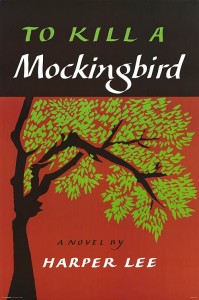July 15, 2015
The Melville Haz Book Club #1: To Kill A Mockingbird
by Scaachi Koul
This is the first installment of a series of letters between Hazlitt’s Scaachi Koul and Melville House’s Alex Shephard about classic novels they may or may not have read growing up. The first letters in the series are devoted to To Kill A Mockingbird. You can read the second installment here.
Hi Alex,
Are you done reading yet? I hope you are because I’m ready to talk. I, a brown lady in Canada, am ready to you talk to you, a white man in America, about racism against black people in literature. Who better qualified than us, two middle-class assholes who have never met and cannot agree over the correct spelling of “colour”? (THERE’S A U IN IT, BY THE WAY.)
I feel like you can always tell how emotionally attached someone gets to books by imagining what their childhood was like. You seem like the type who didn’t have a lot of friends and therefore clung to whatever characters appealed to him in books. (I don’t have any real reasoning for this conclusion, but, you’re in publishing so clearly something very bad happened to you as a child.)
I read To Kill A Mockingbird when I was 12, then again when I was 13, and one more time at 14. (I went to public school in Calgary, Alberta, in a supremely white and conservative district. I guess considering the sheer volume of white kids in my school, they really wanted to beat the message into us.) Speaking of which, do you feel bad for being white? Or is it, like, basically amazing all the time? I feel like it’s probably really great! Good for you, A.
I was happy to read this book year after year because I loved Scout. Scout wore overalls and got messy and didn’t know how to say the right thing. She was perfect. I was well ensconced in my preteen tomboy phase and I wanted to make mud-pies (did not know what a mud-pie was) and beat up boys at school and basically ignore my mother in pursuit of bonding with my heteronormative father.
Which is all to say that I think I missed the point entirely. Everyone remembers To Kill A Mockingbird as a revolutionary book about racism and its insidious effects. Still, I remembered Jem and Scout and fucking Dill, that goddamn incompetent idiot, and Boo Radley. I loved and pitied Boo Radley so much, in fact, that I hardly remembered Tom Robinson at all.
Do you remember that he dies, Alex? He dies and I forgot about that part entirely because in my first, second, and third childhood readings of the book, I was far more concerned with creating a firm yet sexy image of Atticus Finch in my head.
Or maybe it’s just a matter of context. I read the book just after 9/11, when the tides in my junior high had turned against me, and my classmates decided I was a terrorist thank to my thick hair and dark skin. The books that formed your childhood have a very different appreciation when reread in another time, another place, another mindframe. Children tend to connect more with people than ideas or social action, and that might have been Harper Lee’s intention anyway. This is, ultimately, a book for children and it makes more sense to present Tom Robinson as an object of childhood fascination rather than a representation of how white supremacy can kill a man.
But how much are we supposed to expect from a book? Does reading something like To Kill A Mockingbird save our souls, does it make us better people, does it change our minds, does it give us some humanity? As a kid, I remember being afraid of black people because my parents—who are Indian, and that community continues to have their own cultural biases against the black community for reasons far more complicated than I can grasp—raised me with a certain level of fear towards black men. That’s something I had to work at as a teenager and adult to fight against, and reading about gentle Tom Robinson didn’t exactly influence me to feel otherwise. After all, I was always reading the book through Scout looking at Boo Radley.
Actually, rereading it just made me feel guilty for ignoring every theme about racism in order to focus more on all the white children. Is that my fault? Or did Harper Lee write the book intentionally with white kids at the core to make it easier for her readers to get into a story about the damage done by white supremacy?
But hey, you’re white—you should feel far worse than me anyway. What did you think?
Talk soon,
Scaachi
(PS—favourite, favour, and neighbourhood all have u’s in them.)
Scaachi Koul is the managing editor of Hazlitt. Her debut collection of essays, The Pursuit of Misery, is forthcoming spring 2017 (Doubleday Canada).
